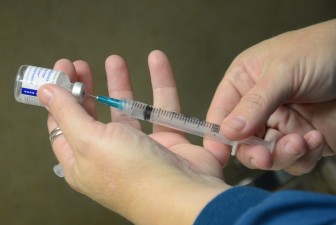As Flu Season Begins, Shots Boost Health and Bottom Lines
It’s the start of flu season, which for many people means a date with a needle. The Centers for Disease Control and Prevention recommends influenza vaccines for people over six months old. And if you’ve been to a drug store lately, you may have noticed some strong encouragement to get the shot. You might even see incentives like gift card offers on grocery receipts. So why the big push?
The economics of flu vaccines are complicated; costs, revenues, insurance reimbursements, government regulations, and other variables come into play. But the main goal of any retail drug chain is relatively simple: profit.
Dylan Roby teaches at the University of Maryland School of Public Health. He points to some examples from recent years.
“CVS and Walgreens both posted year-over-year, same-store increases, and they chalked it up to enhanced marketing of flu shots. If you’re seeing it happening, generally they’re at least breaking even if not making money off of it.”
And when they’re just breaking even, or even selling at a slight loss, it’s still logical to push those sales because the vaccines expire — better to sell them while they’re current and recoup something rather than take a much larger loss.
Unless covered by insurance, the shots typically cost consumers between $20 and $35 per dose. But there’s yet another financial reason pharmacy chains sell the vaccines: to get people into the store.
“People will come in for their flu shot and add on other services,” says Roby. “There’s probably this mix of they can make money, and they also might get revenue from these add-on products that people are buying.”
That’s not the only “mix” here. Flu vaccines are a product where profit motives and medical motives merge. Some employers offer the shots for free because that can mean fewer sick days. And many doctors say flu shots are a no-brainer. When I ask University of Alabama at Birmingham epidemiologist Bernard Camins whether I should get a flu shot, he answers in two words: “You should.”
And he says that’s true every influenza season. The flu and the vaccines change every year as researchers try to predict future viruses and come up with good matches. Sometimes they’re very effective; sometimes less so. But even if the vaccines don’t prevent the latest flu strain completely, Camins says they could make you and your family less sick.
“Instead of missing work for five days, potentially you would only miss two or three days,” he says, adding that partial immunity can build up over time: “Especially if you do the yearly flu vaccine, the cumulative doses of taking it every year would give you some immunity as well.”
Despite that and the financial benefits of selling flu shots, less than half the population of the United States is vaccinated. Camins points out flu and its complications hospitalize hundreds of thousands and kill tens of thousands each year.
Many local health departments offer flu vaccines for free, most often for children but increasingly for adults too. The CDC recommends getting flu shots before the end of October but says late is better than never. The shots take about two weeks to be effective. This year the CDC is not recommending the nasal mist form of the vaccine.
‘One year of failure.’ The Lancet slams RFK Jr.’s first year as health chief
In a scathing review, the top US medical journal's editorial board warned that the "destruction that Kennedy has wrought in 1 in office might take generations to repair."
Here’s how world leaders are reacting to the US-Israel strikes on Iran
Several leaders voiced support for the operation – but most, including those who stopped short of condemning it, called for restraint moving forward.
How could the U.S. strikes in Iran affect the world’s oil supply?
Despite sanctions, Iran is one of the world's major oil producers, with much of its crude exported to China.
Why is the U.S. attacking Iran? Six things to know
The U.S. and Israel launched military strikes in Iran, targeting Khamenei and the Iranian president. "Operation Epic Fury" will be "massive and ongoing," President Trump said Saturday morning.
Sen. Tim Kaine calls on the Senate to vote on the war powers resolution
NPR's Scott Simon talks to Sen. Tim Kaine, D-Va., about the U.S. strikes on Iran.
Iran strikes were launched without approval from Congress, deeply dividing lawmakers
Top lawmakers were notified about the operation shortly before it was launched, but the White House did not seek authorization from Congress to carry out the strikes.




